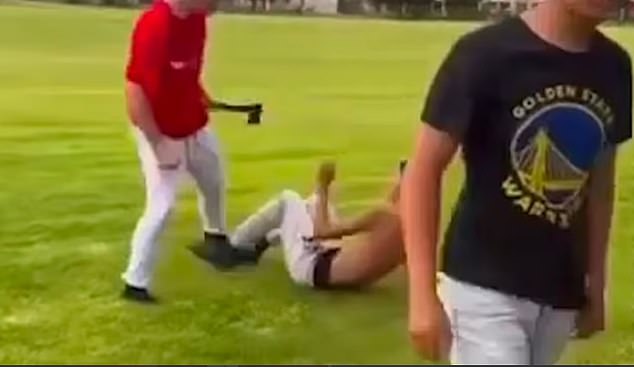An Australian city has been ranked the 18th most dangerous city in the world, with crime and safety rates equal to those of Mexico’s murder capital, Tijuana.
In an embarrassing first, Alice Springs has been ranked as the first Australian city to make it into the world’s top 20. Semi-annual crime rate by city ranked by Numbeo.
Topping the 2024 mid-year index are the crime-ridden South African cities of Pietermaritzburg and Pretoria.
It is followed by the Venezuelan capital, Caracas, and the capital of Papua New Guinea, Port Moresby.
Next in line are three other South African cities: Johannesburg, Durban and Port Elizabeth, followed by the Brazilian cities of Rio de Janeiro and Salvador.
Another South African city, Cape Town, is in 17th place and next up is Alice Springs, the country’s iconic outback town that was catapulted onto this infamous list by years of lawlessness with gangs of children roaming the streets committing crimes.
Although this is the second year that the city has appeared among the top 20, just two years ago it was not even among the 450 cities with the highest crime rate.
The worst places in Australia in 2022 were the cities of Gosford on the central coast of New South Wales (58th) and Cairns (72nd).
In January 2023, the 16-year-old son of an Alice Springs hospitality worker was attacked by youths and hit with an axe on the face, stomach and legs.
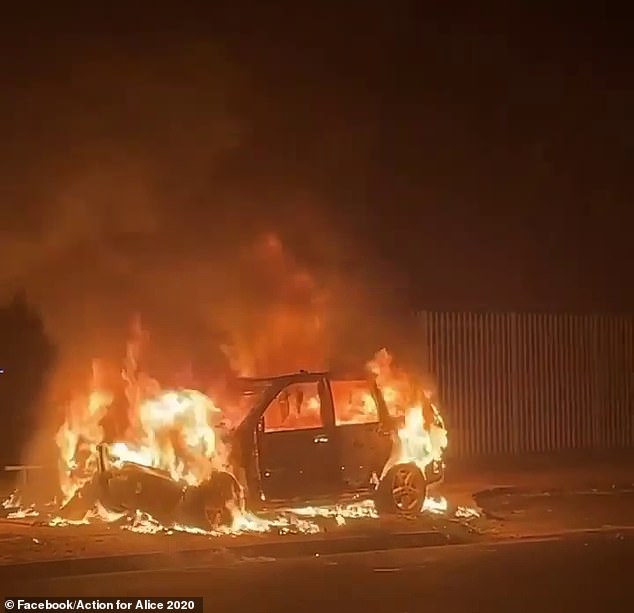
A stolen car is set on fire on an Alice Springs street after gangs of youths were seen roaming around under the influence of alcohol.
In the latest index, Alice Springs ranked in the top 20 with a crime rate of 72.1 and a safety index of 27.9.
The safest city among the 311 listed in the mid-year ranking is Abu Dhabi in the United Arab Emirates, which scores 11.8 for crime and 88.2 for safety.
Two other UAE cities, Dubai and Ras al-Khaimah, are among the safest and lowest in crime.
Australia has eight cities on the list. Canberra is the safest, with a crime rate of 26.4 and a safety index of 73.6, as are the Chinese cities of Shenzhen and Beijing.
Gold Coast is Australia’s second most dangerous city, ranking 139th in the world, with average scores for crime (46.9) and 53.1 for safety.
They are followed by Melbourne (163rd), Perth (175th), Brisbane (208th), Sydney (219th) and Adelaide (229th).
Auckland, New Zealand (122nd) is more dangerous than any Australian city except Alice Springs, followed by Christchurch (156th) and Wellington (223rd).
The wave of violence that turned Alice Springs into an unsafe outpost has been blamed on the Albanian government’s decision to lift alcohol bans two years ago.
The problems were “immediate” when the Stronger Futures Act in the Northern Territory ceased on July 17, 2022, meaning alcohol became available in many of the Territory’s towns’ Indigenous camps for the first time since 2007.
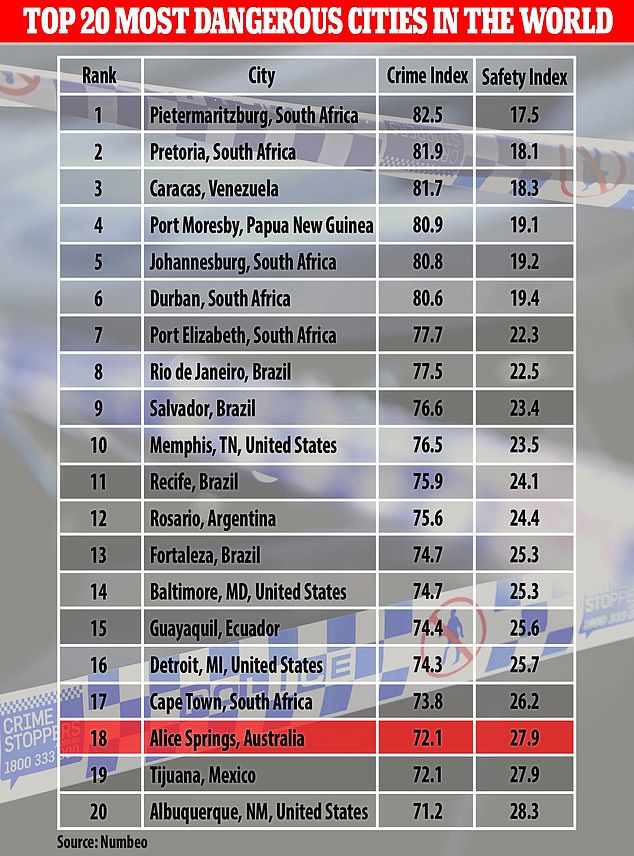
Alice Springs has been included in the world’s top 20 most dangerous cities for the second year in a row, but just two years ago it was not even among the 450 worst places.
The children began drinking alcohol, “sometimes in the form of hand sanitizer diluted in soda, or consuming deodorant, gasoline or glue,” and using weapons such as machetes and axes.
As a result, the city’s crime rate soared, with gangs of up to 200 children roaming the streets at night, committing crimes such as breaking into houses and stealing cars.
Residents complained of living in fear and being forced to hide in their homes as children as young as five years old rioted in the streets.
Videos and images posted on local bakery owner Darren Clark’s Action For Alice Facebook page (showing the illegal behaviour seen before the alcohol was removed) made global news.
Mr Clarke’s latest posts from the latest weekend of violence show things have not really changed, despite a promise by Northern Territory Police Commissioner Michael Murphy to install a Territory Security Division in Alice Springs to restore law and order.
Operated by Deputy Commissioner Janelle Tonkin with 18 highly trained officers, the division was to have “specific responsibilities in juvenile delinquency, high-visibility policing and rapid response to law enforcement situations.”
Last weekend, three hooded and masked men wielding machetes broke into a home at 3.30am occupied by a mother and her four children, aged between three and 14, according to Action for Alice.
The alleged attackers, aged between 18 and 30, pointed a machete at the eight-year-old boy to keep him quiet and held the mother to the throat while demanding alcohol.
The 14-year-old protected the three-year-old as the mother pleaded for her children’s safety, and a six-year-old slept through the entire ordeal.
The intruders took the alcohol and left. Clark said the situation had deteriorated since a curfew to curb violence against young people was lifted in April.
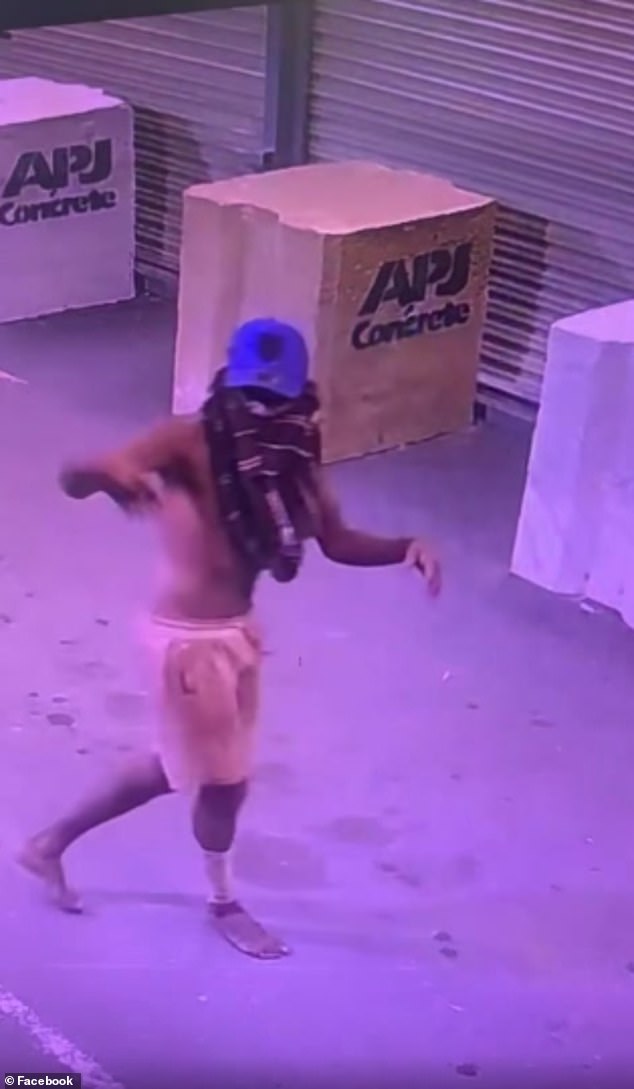
With his face disguised, a young man prepares to throw himself against the rolling metal door of a liquor store to drink alcohol, a product that continues to cause robberies last weekend.
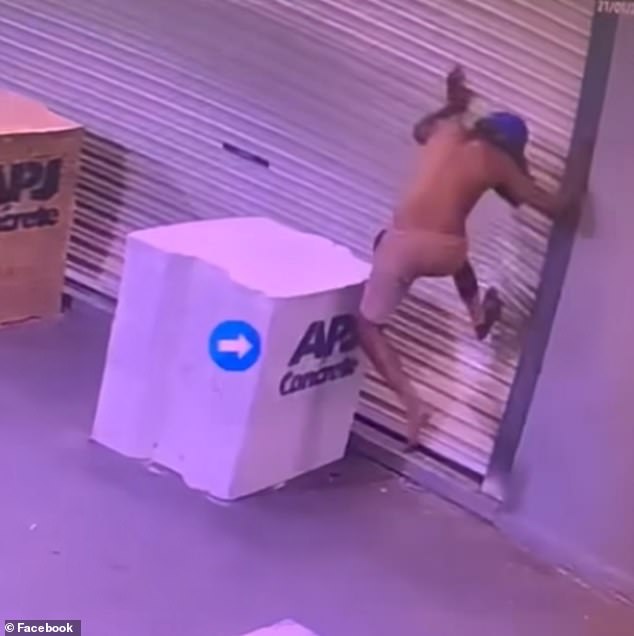
The young man slams his feet against the door of the liquor store.
The site reported that car windows were smashed at the Mercure resort last week, and on Saturday night windows were smashed when burglars tried to break into rooms.
Just two weeks ago, a gang of 20 youths attacked police officers, prompting calls for a snap 72-hour lockdown.
Mr Clark posted on Sunday: “Another machete home invasion. Totally out of control. We are under attack. Where is the police commissioner now?”
“Where is the Territorial Security Division that everyone was bragging about? Does it even exist?”

